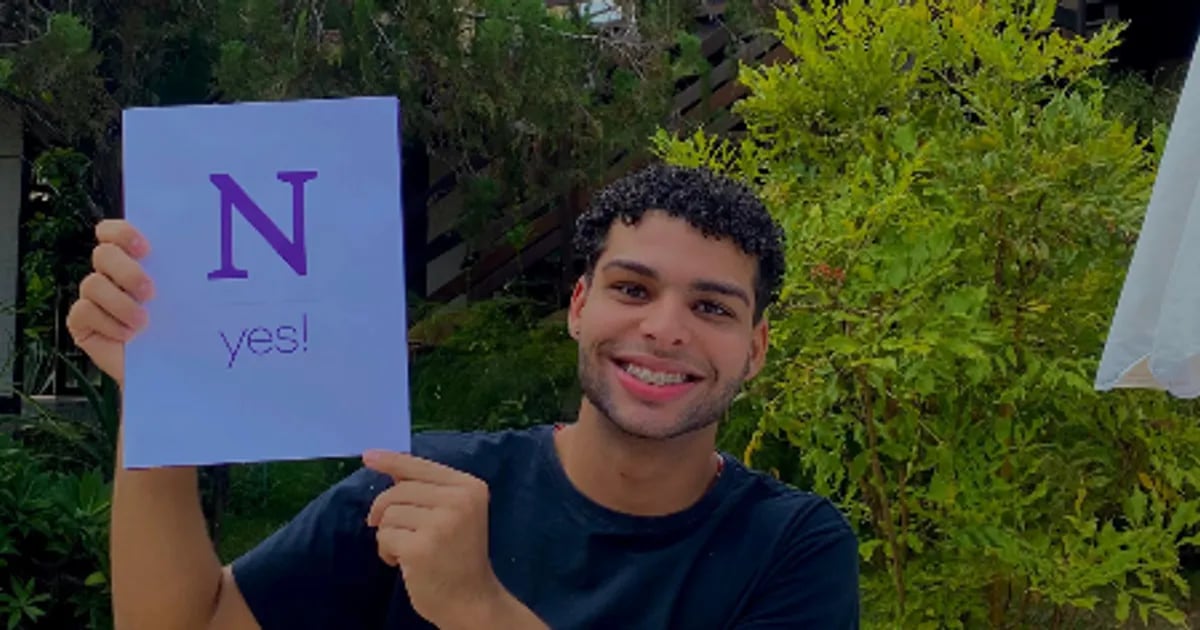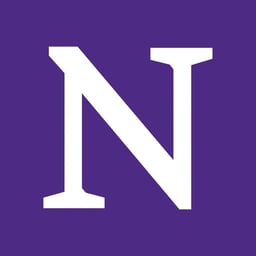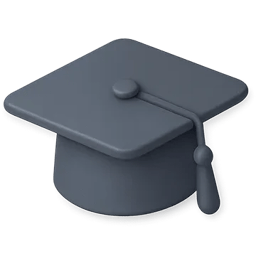Bonjour ! Je m'appelle Jean, et je fais partie d'une communauté autochtone au Brésil. J'ai été admis dans la promotion 2029 de Northwestern University. Découvrez comment j'y suis parvenu !

Mon parcours
Je viens de la plus grande communauté autochtone d'Amérique latine, le Quilombo Kalunga. Les Quilombos étaient des communautés formées par des esclaves évadés au Brésil, et aujourd'hui, beaucoup existent encore en tant que communautés quilombolas, préservant l'héritage africain et luttant pour les droits fonciers et la justice sociale.
J'ai toujours étudié dans ma communauté, avec des enseignants locaux. À partir du lycée, notre expérience en classe a considérablement changé. Mais malgré ces limitations, mon école m'a toujours soutenu. Les enseignants ont rédigé des lettres de recommandation pour mes candidatures, m'ont envoyé des messages d'encouragement et m'ont toujours encouragé.
Mais il est important de comprendre qu'il s'agit d'une école au sein d'un quilombo — tout le processus de candidature à l'université était inconnu pour tout le monde là-bas. Les enseignants ne savaient pas ce qu'une lettre de recommandation était censée inclure, et encore moins comment en écrire une en anglais. Heureusement, un programme de mentorat m'a soutenu, moi et mes enseignants — ils ont expliqué ce que les lettres devaient transmettre, ont aidé à guider le processus d'écriture et se sont occupés de les traduire en anglais.

Décider d'étudier à l'étranger
Ma mère était l'une des premières personnes de notre communauté à aller à l'université, pas à l'étranger, mais au Brésil. Elle a étudié l'Éducation Rurale à l'Université de Brasília, dans une extension de campus spécifiquement conçue pour les étudiants quilombolas. Elle est devenue enseignante pendant un certain temps, mais a finalement quitté la profession. Néanmoins, elle m'a toujours inspiré à valoriser l'éducation et à me voir comme faisant partie de ce monde.
Un jour, en regardant un livestream, je suis tombé sur le programme Jovens Embaixadores - un programme d'échange entièrement financé aux États-Unis pour 50 étudiants brésiliens des écoles publiques. J'ai postulé deux fois. La première fois, je n'ai pas été accepté, mais à ma deuxième tentative, j'ai été retenu. Ce moment a donné un sens à mon histoire et à mon existence. Avant cela, les opportunités ne m'atteignaient jamais vraiment. Un ami m'a dit un jour qu'il y a un "trou noir" qui se situe entre nos communautés et les opportunités qui sont censées nous atteindre - il les aspire toutes avant qu'elles ne puissent arriver. C'est exactement ce que je ressentais. Mais après l'échange, soutenu par l'ambassade et le gouvernement américains, tout a changé. J'ai pu échanger avec des diplomates, apprendre sur différentes cultures et me connecter avec 49 autres étudiants incroyables. Mon monde s'est élargi.
Pendant le voyage, nous avons rencontré EducationUSA et avons appris l'existence du Opportunity Funds Program. J'ai tenté ma chance et j'ai postulé. J'ai été accepté à nouveau. C'était lors de ma dernière année de lycée, quand j'ai commencé à postuler dans des universités à l'étranger. Mais aucune de mes activités n'avait été planifiée en vue de l'université. Tout ce que je faisais - mes activités extrascolaires, mon leadership, mon plaidoyer - était toujours ancré dans le bénéfice de ma communauté. Rien n'était "stratégique" pour une candidature. C'était simplement qui j'étais et ce qui me tenait à cœur.

Pourquoi j'ai choisi les États-Unis
Je n'ai jamais vraiment envisagé d'étudier dans un autre pays que les États-Unis. Après avoir découvert les États-Unis grâce au programme d'échange et vu tant de personnes y étudier, cela me semblait naturel. Même enfant, je regardais toujours des vidéos et rêvais de participer à un programme d'échange, et c'était toujours à propos des États-Unis.
Je pense que ce désir était ancré en moi depuis mon plus jeune âge. Je n'ai jamais pensé à aller ailleurs. Je me suis simplement dit : "Je vais tenter ma chance aux États-Unis." C'est un rêve que je porte en moi depuis aussi longtemps que je m'en souvienne - depuis que j'étais enfant et que je disais : "Je veux faire un échange aux États-Unis" ou "Je veux visiter les États-Unis un jour."

Pourquoi Northwestern ?
L'une des principales raisons pour lesquelles je pouvais vraiment m'imaginer à Northwestern était que j'ai appris à connaître des personnes qui y avaient déjà étudié, et leur énergie était contagieuse. Il y a une magie dans cet endroit que vous ne pouvez même pas imaginer, l'esthétique et l'environnement, tout m'a captivé.
Non seulement cela, mais en faisant mes recherches, j'ai découvert qu'ils ont un programme de théâtre axé sur les récits noirs. J'ai également appris que leur programme de politique publique pourrait être parfait pour mes objectifs, surtout après en avoir entendu parler par un ami qui y a été admis.
Ce n'était pas une chose spécifique qui m'a fait sentir chez moi - c'était tout. Des professeurs aux systèmes de soutien, je pouvais vraiment m'imaginer m'épanouir là-bas. Northwestern offre tout ce que je n'ai jamais eu dans ma vie : des opportunités, des professeurs qualifiés et une communauté solide.
Là-bas, je pourrais aussi me voir faire partie de leur club Rainbow Alliance, qui résonnait avec mes valeurs. Tout cela m'a fait sentir que l'université pourrait vraiment devenir mon chez-moi.

Mes résultats : SAT, moyenne générale et DET
La préparation au SAT a été extrêmement difficile, étant donné que je viens de Quilombo. Après deux tentatives infructueuses, où je n'ai même pas pu atteindre les mille points, mon mentor et moi avons décidé que je postulerais sans les résultats du test.
Il m'a dit : "Tu es un étudiant exceptionnel. Toutes les universités auxquelles tu postuleras comprendront ton contexte car ce n'est pas seulement une question de notes. Ce qui compte, c'est ton histoire. Tu dois avoir une histoire à raconter." Et au-delà de cela, j'avais des activités extrascolaires qui soutenaient et prouvaient cette histoire. Alors, je me suis concentré sur le test de compétence linguistique, et nous avons décidé d'économiser de l'argent. Au lieu de passer le SAT, nous économiserions pour le vol après mon admission.
Au Duolingo English Test, j'ai obtenu un score de 130, et ma moyenne générale était de 9,13 sur 10.

Conseils pour vous préparer
J'étais vraiment débordé pendant ma dernière année de lycée. Je devais consacrer du temps à postuler dans des universités à l'étranger tout en suivant mes cours, en maintenant mes notes et en rendant mes devoirs. Tout gérer était chaotique. C'est pourquoi j'ai décidé de prendre une année sabbatique. Cela m'a donné l'occasion de vraiment comprendre qui j'étais. Pendant cette période, j'ai assisté à plusieurs conférences et participé à des événements qui m'ont aidé à entrer en contact avec des établissements d'enseignement spécifiques. C'était une opportunité incroyable pour explorer et me découvrir.
Pendant mon année sabbatique, j'ai eu le temps de postuler, de visiter des cascades, de passer du temps avec ma famille - des choses que je ne pouvais pas faire quand j'étais à l'école. J'ai toujours été quelqu'un qui fait beaucoup de choses et qui se donne beaucoup aux autres, mais pendant mon année sabbatique, je me suis donné à moi-même. Si je pouvais donner un conseil, je dirais : prenez une année sabbatique si vous voulez postuler. Ce n'est pas grave si vous ne pouvez pas, mais si vous le pouvez, ça en vaut vraiment la peine. Au début, je ne voulais pas en prendre une, mais avec le réseau de soutien que j'avais, ils m'ont convaincu, et avec le recul, c'était la meilleure décision que j'aie jamais prise. Je n'ai pas perdu mon temps - je me suis consacré à un projet social et à redonner à la communauté. J'ai fini par avoir un impact énorme sur les enfants à travers le Brésil, en particulier dans ma communauté. L'année sabbatique a vraiment changé ma vie.
Un autre conseil que je donnerais est de vous concentrer sur votre histoire. Ne stressez pas trop sur les tests de compétence. Étudiez et réussissez bien sûr, mais rappelez-vous que c'est le processus holistique qui compte le plus. Les universités veulent comprendre votre parcours, vos activités extrascolaires et qui vous êtes en tant que personne - à quel point vous êtes spécial et inspirant. Un score à un test ne peut pas vous définir sans le contexte de votre vie, vos expériences et vos valeurs. Prenez votre temps. Regardez des films le week-end pour vous ressourcer, afin de revenir avec l'énergie nécessaire pour postuler et vous concentrer sur le côté humain de votre histoire.
Pendant mon année sabbatique, je me suis davantage concentré sur le côté humain - apprendre davantage, me consacrer à des projets et travailler à l'amélioration de l'éducation dans ma communauté. Je ne voulais pas partir sans avoir d'abord eu un impact positif ici. Il était également important pour moi de continuer à bien réussir à l'école et de participer à des projets de bénévolat, mais pas seulement dans le but de postuler. Il est crucial de montrer qui vous êtes en dehors de la salle de classe. Participez à des projets qui correspondent à vos valeurs, pas seulement à ceux que tout le monde fait pour passer. Faites ce qui vous passionne. Vous devez être capable de parler et d'exprimer votre implication dans ces activités.
Je pense que ce sont mes conseils les plus importants : soyez vous-même et racontez votre véritable histoire. Faites entendre votre voix.
Activités Extrascolaires
Tout d'abord, j'ai écrit un livre dans le cadre d'un projet de recherche sur les plantes médicinales de ma communauté. C'était un effort collectif où nous avons travaillé avec des leaders locaux et des chercheurs. Le livre s'intitule "Plantes Médicinales des Kalungas", et son but est de préserver le savoir ancestral de nos aînés et de le transmettre aux générations futures. C'était l'une de mes activités extrascolaires les plus importantes, profondément liée à ma communauté.
La deuxième était Agecos Ambientais (Amis de l'Environnement). Lors d'une foire culturelle, j'ai appris qu'un incendie massif s'était produit à Chapada dos Veadeiros en 2021, détruisant une grande partie de nos ressources naturelles. Nous perdions de précieuses ressources en eau et en biodiversité, et je ne pouvais pas rester les bras croisés. Je voulais agir, alors j'ai créé une organisation appelée Ajecos Ambientais avec trois amis. Nous avons fait des présentations dans les écoles, cultivé plus de 100 plantes natives de notre région avec l'aide de l'IBAMA, et organisé des efforts de reboisement avec la communauté. Nous avons également invité des anciens locaux à parler de l'importance de préserver notre patrimoine naturel.
Un autre projet dont je suis fier est la création du premier Conseil des Élèves de mon école. J'ai toujours été une personne curieuse, et j'ai subi beaucoup de harcèlement. Je ne voulais pas que d'autres personnes vivent la même chose, alors j'ai décidé de créer le conseil. Je ne savais même pas par où commencer, mais j'ai rassemblé quelques amis, mobilisé les enseignants, et nous avons créé la Geração Calunga Revolucionária (Génération Kalunga Révolutionnaire). Nous avons organisé des événements, comme celui pour la Journée de la Conscience Noire, qui a rassemblé toute la communauté. C'était un bel événement où nous avons partagé nos histoires personnelles et créé un lien plus fort avec les enseignants.
De plus, j'ai fondé un groupe de théâtre appelé Arte Kalunga MATEC. "Mateque" fait référence à l'environnement, la tradition et l'éducation. Nous avons joué des pièces sur les origines du quilombo pour les touristes et les étudiants locaux. Ce projet a été créé par mon premier professeur pour encourager le leadership des jeunes. Beaucoup de jeunes de mon âge ou plus jeunes ont du mal à s'exprimer, donc cette initiative les a aidés à trouver leur voix et à apprendre à partager leurs histoires, comme ce qu'est le territoire Kalunga et ce qu'il signifie pour nous.
En outre, j'ai fait du bénévolat avec PROFUTURO, une organisation qui soutient les enfants en situation vulnérable. J'ai également été bénéficiaire de cette ONG, recevant de l'aide pour la nourriture et d'autres nécessités.
Je suis également directeur des opérations de Tocando em Frente, une organisation à but non lucratif éducative qui impacte plus de 12 000 enfants à travers le Brésil.

Ma déclaration personnelle
Je me souviens qu'un mentor m'a dit un jour que je me concentrais trop sur la répétition du même récit concernant ma communauté. Il m'a averti que si j'abordais ce sujet trop souvent, à la fois dans mes essais universitaires et ma déclaration personnelle, cela pourrait devenir répétitif. Alors, j'ai pris du recul et je me suis demandé : "Est-ce logique d'écrire autre chose ?" La vérité est que ce que je veux leur montrer, c'est précisément ma communauté - mon peuple, mon identité en tant que Kalunga quilombola. C'est qui je suis, et il est essentiel pour moi de le souligner dans chaque partie de ma candidature car c'est ma voix, mon essence. C'est pourquoi ma communauté fera définitivement partie de mon histoire.
Dans ma déclaration personnelle, j'ai partagé une expérience de mon temps de bénévolat avec PROFUTURO, l'organisation qui soutient ma famille en tant que communauté vulnérable. Nous menions une campagne de sensibilisation sur la ligne d'assistance Disque 100, qui sert à signaler les cas d'abus sexuels, en particulier dans des communautés comme la mienne. Malheureusement, ces types de crimes sont alarmants dans ma ville, et j'ai senti qu'il était important d'agir. Je ne suis pas du genre à rester inactif, alors je me suis dit : "Faisons en sorte que ces numéros parviennent à chaque foyer", et c'est ce que nous avons fait. Nous sommes allés de porte en porte pour distribuer l'information. J'ai même mentionné comment j'ai peint un papillon sur le visage d'un enfant pendant la campagne.
Pendant que je faisais cela, je me suis rendu compte que j'avais oublié d'inclure le numéro Disque 100 dans les documents que nous distribuions. J'ai donc rapidement ajouté cette information tout en continuant de peindre le papillon. C'est à ce moment-là que j'ai vraiment commencé à raconter l'histoire, en me concentrant sur la façon dont j'ai traité les problèmes d'abus sexuels dans ma communauté et comment j'ai travaillé sur le signalement des cas et la protection des enfants à travers mon rôle de représentant au CTA (Conseil de l'Enfance et de l'Adolescence) et au CONANDA (Conseil National de l'Enfance et de l'Adolescence). Nous avons lutté pour les droits des enfants aux niveaux local, étatique et national, et j'ai porté les besoins des enfants de mon quilombo sur ces plateformes.
C'était une mobilisation significative, et je me suis beaucoup concentré sur la façon dont j'ai surmonté les défis et comment j'aidais activement les enfants dans le besoin. C'est une histoire puissante qui reflète ma croissance personnelle et mon engagement envers ma communauté. Je suis vraiment fier de ma déclaration personnelle - c'est l'un de mes textes préférés, et j'espère que vous aurez l'occasion de le lire un jour.
Aide financière
J'ai obtenu une bourse complète pour étudier à Northwestern. Je devrai travailler pour économiser de l'argent pour mes dépenses personnelles en dehors de l'école, mais ils couvriront tout le reste - la nourriture, l'aide, les livres. Ils me donnent même un pass multimodal pour les transports. Donc, ils prennent vraiment soin de tout, et je n'aurai rien à payer - littéralement zéro.
Je n'ai pas eu à faire de demande séparée, j'ai seulement dû envoyer mon CSS Profile complet.




